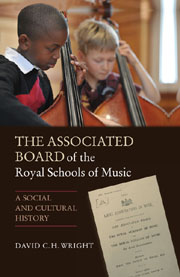Book contents
- Frontmatter
- Contents
- List of Illustrations
- List of Tables
- Dedication
- Preface
- List of Abbreviations
- Miscellaneous Conventions
- Introduction: The Context for a History
- I THE BACKGROUND
- II THE BOARD ESTABLISHED, 1889–1920
- 3 The ABRSM Idea and the First Exams, 1889–91
- 4 The Early History, 1892–1920
- 5 The ABRSM and the ‘British World’
- III THE INSTITUTIONAL CULTURE, 1920–83
- IV THE BOARD REVIVED, 1983–2009
- Appendix 1 Speech and Drama Examinations
- Appendix 2 ABRSM Personalia, 1889–2010
- Select Bibliography
- Index
4 - The Early History, 1892–1920
from II - THE BOARD ESTABLISHED, 1889–1920
Published online by Cambridge University Press: 05 July 2013
- Frontmatter
- Contents
- List of Illustrations
- List of Tables
- Dedication
- Preface
- List of Abbreviations
- Miscellaneous Conventions
- Introduction: The Context for a History
- I THE BACKGROUND
- II THE BOARD ESTABLISHED, 1889–1920
- 3 The ABRSM Idea and the First Exams, 1889–91
- 4 The Early History, 1892–1920
- 5 The ABRSM and the ‘British World’
- III THE INSTITUTIONAL CULTURE, 1920–83
- IV THE BOARD REVIVED, 1983–2009
- Appendix 1 Speech and Drama Examinations
- Appendix 2 ABRSM Personalia, 1889–2010
- Select Bibliography
- Index
Summary
The exams
AS far as the Board's work in the UK is concerned, the period 1892 until 1914 was essentially one of consolidation that saw only a cautious expansion of its scheme of exams. The success of its early exams created a demand for additional ones to cater for a wider gamut of musical levels and abilities, particularly at the earlier stages, but the Board seemed reluctant to extend the scope of its examination scheme much beyond what had originally been envisaged. It is worth emphasizing quite how limited the original scheme was. Tables 4.1 and 4.2 trace the development of the Practical and Written exam structure from 1890 until 1933. The first shows that the original two Local Centre Exams of 1890 were the equivalent of today's Grades 6 and 7, an advanced stage for which there was no opportunity to prepare. Even the first two ‘School’ exams (now Grades 4 and 5), instituted in response to requests for exams at a preparatory stage to the Local Centre Exams, were still relatively ambitious. But the Board did not respond very quickly in providing lower grade exams: Elementary (Grade 2) was introduced in 1897 and Primary (Grade 1) only in 1906. Unfortunately, the only record of developments between 1891 and 1905 is in the published Annual Reports; the minute books for these years, with their details of decisions and underlying debates, are missing. But it is reasonable to infer that it took the Board quite a long time to face up to the longer-term implications of its initial success.
- Type
- Chapter
- Information
- The Associated Board of the Royal Schools of MusicA Social and Cultural History, pp. 76 - 91Publisher: Boydell & BrewerPrint publication year: 2013



